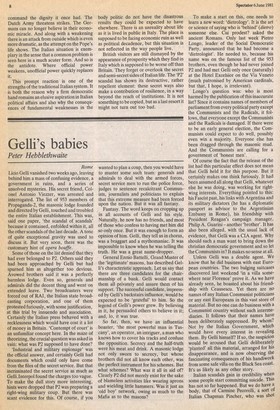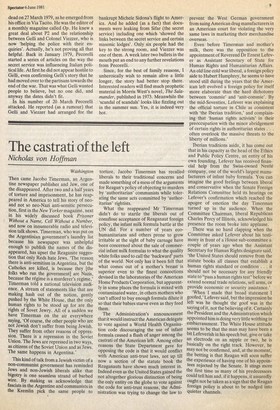Gelli's babies
Peter Hebblethwaite
Rome Licio Gelli vanished two weeks ago, leaving behind him a mass of confusing evidence, a government in ruins, and a series of unsolved mysteries. His secret friend, Colonel Antonio Viezzer, was arrested and interrogated. The list of 953 members of Propaganda-2, the masonic lodge founded and directed by Gelli, touched and troubled the entire Italian establishment. This was, said one paper, 'the scandal of scandals' because it contained, enfolded within it, all the other scandals of the last decade. A tone of quite exceptional gravity was used to discuss it. But very soon, there was the customary hint of opera bouffe.
Some of those on the list denied that they had ever belonged to P2. Others said they had been approached by Gelli but had spurned him as altogether too devious. Avowed brothers said it was a perfectly harmless lodge. Even so, generals and admirals did the decent thing and went on extended leave. Two broadcasters were forced out of RAI, the Italian state broadcasting corporation, and one of them protested furiously, with some justification, at this trial by innuendo and association. Certainly the Italian press behaved with a recklessness which would have cost it a lot of money in Britain. 'Contempt of court' is an unfamiliar concept here. In the maze of theorizing, the crucial question was asked in vain: what was P2 supposed to have done?
'Industrial and military espionage' was the official answer, and certainly Gelli had documents which could only have come from the files of the secret service. But that incriminated the secret service as much as Gelli.Interpol found the charges too vague. To make the dull story more interesting, hints were dropped that P2 was preparing a right-wing military coup. But there was scant evidence for this. Of course, if you wanted to plan a coup, then you would have to muster some such team: generals and admirals to deal with the armed forces, secret service men to run the police force, judges to sentence recalcitrant Communists, journalists and politicians to explain that this extreme measure had been forced upon the nation. But it was all fantasy.
Fantasy. The word keeps on cropping up in all accounts of Gelli and his style. Naturally, he now has no friends, and most of those who confess to having met him did so only once. But it was enough to form an opinion of him. Gelli, they tell us in chorus, was a braggart and a mythomaniac. It was impossible to know when he was telling the truth. He was a great name-dropper.
General Ennio Battelli, Grand Master of the 'legitimate' masons, has described Gelli's characteristic approach. Let us say that there are three candidates for the chairmanship of a bank. Gelli would contact them all privately and assure them of his support. The successful candidate, impressed by Gelli's backstairs influence, would be expected to. be 'grateful' to him. So the legend of Gelli's power grew. By believing in it, he persuaded others to believe in it; and, lo, it was true.
So far, then, we have an influential boaster, 'the most powerful man in Tuscany', an operator, an intriguer, a man who knows how to cover his tracks and confuse the opposition. Secrecy and the half-truth were his meat and drink. A masonic lodge not only sworn to secrecy, but whose brothers did not all know each other, was the perfect instrument for his schemes. But what schemes? What was it all in aid of? Clearly P2 did not merely exist for the sake of blameless activities like wearing aprons and wielding little hammers. Was it just an 'old boy' network, owing as much to the Mafia as to the masons? To make a start on this, one needs to learn a new word: `dietrology'. It is the art or science of saying who is 'behind' (dietro) someone else. Cui prodest? asked the ancient Romans. Only last week Pietro Longo, leader of the Social Democratic Party, announced that he had become a `dietrologise. He needed to, because his name was on the famous list of the 953 brothers, even though he had never joined P2 and had met Gelli only once (naturally) at the Hotel Excelsior on the Via Veneto (much patronised by American cardinals, but that, I hope, is irrelevant).
Longo's question was: who is most harmed by the publication of this inaccurate list? Since it contains names of members of parliament from every political party except the Communists and the Radicals, it follows, that everyone except the Communists and the Radicals is damaged. If there were to be an early general election, the Communists could expect to do well, possibly even win a majority. Everyone else has been dragged through the masonic mud. And the Communists are calling for a government of 'honest men'.
Of course the fact that the release of the list had this particular effect does not mean that Gelli held it for this purpose. But it certainly makes one think furiously. It had been assumed all along that Gelli, whatever else he was doing, was working for rightwing interests. Everything pointed to this: his Fascist past, his links with Argentina and its military dictators (he has a diplomatic passport as advisor to the Argentinian Embassy in Rome), his friendship with President Reagan's campaign manager, Philip A. Guarini — another 'brother'. It has also been alleged, with the usual lack of evidence, that Gelli was a CIA agent. Why should such a man want to bring down the christian democratic government and so let the Communists in? It makes no sense at all.
Unless Gelli was a double agent. We know that he did business with east European countries. The two bulging suitcases discovered last weekend 'in a villa somewhere near Florence' prove it. As we have already seen, he boasted about his friendship with Ceausescu. Yet there are no names of any Italian Communist politicians or any east Europeans in this vast store of material. But no one can do business with a Communist country without such intermediaries. It follows that their names have been deliberately suppressed. By whom? Not by the Italian Government, which would have every interest in revealing them. By Gelli himself? If so, the suspicion would be aroused that Gelli deliberately 'planted' all this material, arranged for his disappearance, and is now observing the fascinating consequences of his handiwork from some safe villa on the Black Sea coast. It's as likely as any other story.
Italian scandals gain in credibility when some people start committing suicide. This has not so far happened. But we do have a body, that of Carmine Pecorelli, a sort of Italian Chapman Pincher, who was shot dead on 27 March 1979, as he emerged from his office in Via Tacito. He was the editor of a monthly magazine called Op. He knew a great deal about P2 and the relationship between Gelli and Colonel Viezzer, who is now 'helping the police with their enquiries'. Actually, he's not proving all that helpful. Back in January 1979, Pecorelli started a series of articles on the way the secret service was influencing Italian political life. At first he did not appear hostile to Gal, even confirming Gelli's story that he had moved over to the partisans towards the end of the war. That was what Gelli wanted people to believe, but no one did, and anyway the dates didn't fit.
In his number of 20 March Pecorelli attacked. He reported (as a rumour) that Gelli and Viezzer had arranged for the bankrupt Michele Sidona's flight to America. And he added (as a fact) that documents were leaking from Sifar (the secret service) including one which 'showed the links between the secret service and certain masonic lodges'. Only six people had the key to the strong room, and Viezzer was one of them. A week later two bullets in the mouth put an end to any further revelations from Pecorelli.
Since, for the best of family reasons, I unheroically wish to remain alive a little longer, the story had better stop there. Interested readers will find much prophetic material in Morris West's novel, The Salamander, published in 1973. Meanwhile the 'scandal of scandals' looks like fizzling out in the summer sun. Yes, it is indeed very hot.











































 Previous page
Previous page